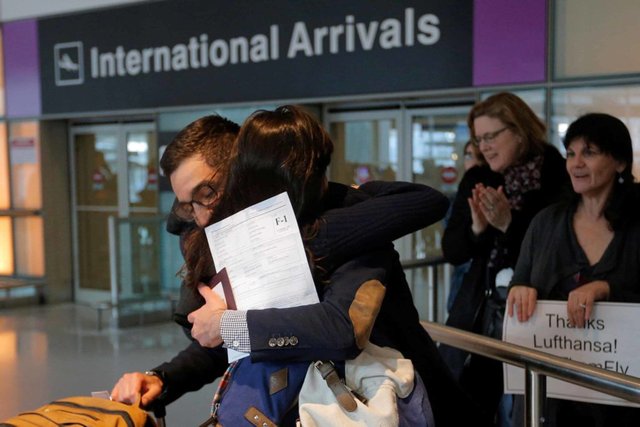The ban is back Trump's travel ban brought back from the dead by Supreme Court

The Supreme Court agreed Monday to review President Donald Trump’s travel ban and partially reversed lower court rulings that blocked the ban from being implemented.
Trump’s travel restrictions on people from six Muslim-majority nations can be applied to individuals “who lack any bona fide relationship with a person or entity in the United States,” the Supreme Court ruled.
The justices will hear the arguments that will determine the ultimate fate of the travel ban in October. In the meantime, the government can begin enforcing parts of the ban over objections from civil liberties groups.
“President Trump’s Muslim ban violates the fundamental constitutional principle that government cannot favor or disfavor any one religion,” Omar Jadwat, director of the ACLU’s Immigrants’ Rights Project, said in a statement. “Courts have repeatedly blocked this indefensible and discriminatory ban. The Supreme Court now has a chance to permanently strike it down.”
When will the ban take effect?
In a memo issued on June 14, Trump ordered government agencies to begin enforcing the ban within 72 hours in the event that injunctions were lifted. The Department of Homeland Security issued a statement Monday that said implementation of the ban “will be done professionally, with clear and sufficient public notice, particularly to potentially affected travelers, and in coordination with partners in the travel industry.”
Trump’s executive order, titled “Protecting the Nation From Foreign Terrorist Entry Into the United States,” was signed on January 27 during his first week in office. The order halted all refugee resettlement and blocked people from seven countries — Iran, Iraq, Libya, Somalia, Sudan, Syria, and Yemen — from entering the U.S., purportedly because those nations presented a heightened risk of terrorism.
“Courts have repeatedly blocked this indefensible and discriminatory ban. The Supreme Court now has a chance to permanently strike it down.”
The ban was promptly challenged by states and refugee groups, which argued that it was unfair and discriminatory. Several federal courts issued injunctions that halted enforcement of the ban. Trump promptly issued a second executive order that removed Iraq from the list of banned countries and watered down some of the provisions. Again, the ban was challenged and blocked, partly on the grounds that Trump repeatedly said on the campaign trail that he intended to block Muslims from entering the country.
In an unsigned opinion, the Supreme Court said the lower court “erred by focusing on the President’s campaign-trail comments,” and called the ban “religiously neutral on its face.”
Who gets banned and who doesn’t?
The ruling also said “the government’s interest in preserving national security” outweighs any hardships caused to people without ties to the U.S. who are blocked from entering the country.
At the same time, however, the justices decided that the ban cannot be applied to people who already have some sort of connection to the U.S. The court specifically mentioned university students who are from the banned countries, as well as “a worker who accepted an offer of employment from an American company or a lecturer invited to address an American audience.”
What happens to refugees?
People who have already started the refugee resettlement process will be allowed to enter, but the Supreme Court said ban can be applied to refugees who don’t already have some type of existing relationship with a U.S. agency.
In a dissent to Monday’s decision, Justice Clarence Thomas expressed concern that “the court’s remedy will prove unworkable.”
“Today’s compromise will burden executive officials with the task of deciding —on peril of contempt — whether individuals from the six affected nations who wish to enter the United States have a sufficient connection to a person or entity in this country,” Thomas wrote, warning there could be “a flood of litigation” over who gets to enter and who is banned.
Read the Supreme Court’s full decision on the travel ban below.

It was never dead. Anyone with half a brain knew that the #SCOTUS would uphold the #TravelBan.
James Jackdrew
Hi! I am a robot. I just upvoted you! I found similar content that readers might be interested in:
https://news.vice.com/story/supreme-court-reinstates-part-of-trumps-travel-ban